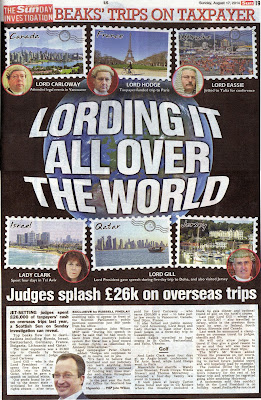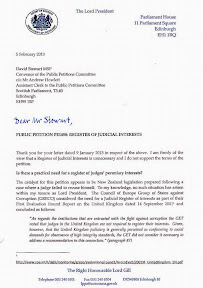 Scotland’s judges prefer taxpayer funded jet travel to dull court duties. SCOTLAND’S wealthy, well connected judges are back on the jet set junket despite an alleged clampdown announced two weeks ago by Lord President & Lord Justice General Brian Gill after a controversy over justices of the peace trying to join the judicial travel circuit junket spree.
Scotland’s judges prefer taxpayer funded jet travel to dull court duties. SCOTLAND’S wealthy, well connected judges are back on the jet set junket despite an alleged clampdown announced two weeks ago by Lord President & Lord Justice General Brian Gill after a controversy over justices of the peace trying to join the judicial travel circuit junket spree.
An investigation by the Scottish Sun newspaper has revealed Scotland's top judges spent £26,000 on thirty three international trips funded by taxpayers in the last year - including journeys to destinations such as Russia, Israel, Switzerland,Germany, France, Bulgaria, Lithuania.
The country’s top judge, Lord Gill – who is still refusing to appear before the Scottish Parliament’s Public Petitions Committee to answer questions from msps on judges undeclared wealth & interests, also jetted off on a FIVE DAY STATE VISIT to Qatar, and gave a sixteen page speech on judicial ethics.
Asked for further details of Lord Gill’s itinerary in Qatar, a spokesperson for the Judiciary of Scotland said no information could be provided as the Lord President is currently on holiday. The Judicial Office has claimed there are no photographs or video footage of Lord Gill’s trip to Qatar, even though the trip was paid for by the taxpayer.
The Scottish Sun reports:
Beaks Trips on Taxpayer
Exclusive : By Russell Findlay Scottish Sun
JET-SETTING judges spent £26,000 of taxpayers' cash on overseas trips last year, a Scottish Sun on Sunday investigation can reveal.
Top beaks flew out to destinations including Russia, Israel, Switzerland, Germany, France, Bulgaria, Lithuania and Qatar.
The most expensive was a £5,800 trip to Canada by Scotland's second most senior judge, Lord Carloway. Lord Gill - who is the Lord President - also spent five days on a £2,800 trip to Doha, Qatar, where he gave speech on judicial ethics.
Our probe found he jetted to the desert state — criticised for its human rights abuses - after twice snubbing calls to appear in front of the Scottish Parliament's public petitions committee just 800 yards from his office.
Committee member John Wilson MSP said: "During his speech in Qatar he said that he had much to learn from that country's judicial system. But Qatar has a poor record on human rights, as identified by Amnesty International."
Legal campaigner Peter Cherbi added: "Judges are supposed to sit in courts, not in jets.
"It's hard to believe that Scotland and our judiciary can learn anything from Qatar, a country accused of funding war. mass murder and chaos throughout the Middle East."
In the past year the Judicial Office for Scotland has paid for Lord Carloway — who earns £208.000 a year - to take part in law events in Vancouver. Canada, and Dijon. France.
It also forked out public money for Lord Armstrong, Lord Boyd and Lady Dorrian to meet other Euro pean judges on a three-day trip to Luxembourg.
Lord Eassie travelled to legal events in St Gallen, Switzerland, and Yalta, Ukraine.
And Lady Clark spent four days at an Anglo-Israeli conference in Tel Aviv, Israel, while Lord Hodge went to Paris.
Meanwhile four sheriffs — Wendy Anne Sheenan, Frank Crowe. Nikola Stewart and Thomas McCartney — attended a four day family law event in Ireland.
It took place at luxury Carton House hotel and spa in Co Kildare where the itinerary included a lack tie gala dinner and optional round of golf on the hotel's course.
Last year Lord Gill — whose salary is £216,307 - also travelled to Jersey, while in the previous three years he went to Ireland, South Africa, Slovenia and Canada.
Last week he announced a clampdown on overseas travel by judges, sheriffs and JPs.
He will only allow judges to travel if they give a good reason to do so and they will also have to write a report about their trips.
The SNP's Mr Wilson added: "Given the pressures on our courts, it's welcome that Lord Gill is seeking to curtail future judicial travel and will hopefully lead by example."
The Judicial Office for Scotland was asked to give details of Lord Gill's itinerary for the rest of his Qatar trip and whether he regretted going after snubbing Holyrood.
A spokesman said they couldn't help as the Lord President is on holiday.
JUDGES JUNKETS - Overseas Travel of Scotland’s Judges 2013-2014:
 6-10 May 2013 Lady Clark Anglo Israeli Conference in Tel Aviv £2,404.00
6-10 May 2013 Lady Clark Anglo Israeli Conference in Tel Aviv £2,404.00
15-17 May 2013 Sheriff MacFayden ERA seminar in Brussels £1,057.37
22 to 25 May 2013 Lord Eassie European Association of Judges meeting in St Gallen, Switzerland £373.30
7-9 June 2013 Lord Tyre ERA meeting in Trier £753.73
5-7 June 2013 Lord Hodge ENCJ GA in Sofia £863.26
5-7 June 2013 Sheriff Normand ENCJ GA in Sofia £775.63
January - June 2013 - - Reimbursement by ENCJ -£162.22
January - June 2013 - - Reimbursement by ENCJ -£162.23
21 - 27 September 2013 Sheriff Liddle CMJA Conference – Jersey £237.34
22 - 24 September 2013 Lady Scott Judicial and Academic Visit in Luxembourg £368.30
22 - 26 September 2013 Sheriff L Wood Commonwealth Law Conference – Jersey £106.71
22 - 26 September 2013 Sheriff Fletcher Commonwealth Law Conference – Jersey £1,445.02
24 - 28 September 2013 Lord Gill Attendance at CMJA Conference – Jersey £102.95
26- 28 September 2013 Lord Hodge Franco-British Judicial Colloque in Paris £425.73
4 - 12 October 2013 Sheriff J P Scott Conference IAJ Yalta £734.50
4 - 12 October 2013 Lord Eassie Conference IAJ Yalta £1,019.64
24 - 27 November 13 Lord Armstrong Meeting of Judges of Member States @ the Court of Justice of European Union: Luxembourg £294.80
24 - 27 November 13 Lord Boyd Meeting of Judges of Member States @ the Court of Justice of European Union: Luxembourg £294.80
24 - 27 November 13 Lady Dorrian Meeting of Judges of Member States @ the Court of Justice of European Union: Luxembourg £294.80
9 - 10 December 2013 Lord Tyre ENCJ Project Group meeting in Brussels £481.76
9 - 10 December 2013 Sheriff Normand ENCJ Project Group meeting in Brussels £514.48
July - December 2013 Reimbursement by ENCJ -£157.82
July - December 2014 - - Reimbursement by ENCJ -£157.83
7-9 February 2014 Sheriff Sheehan Four Jurisdictions Family Lawyers Conference 2014 £599.92
7-9 February 2014 Sheriff Crowe Four Jurisdictions Family Lawyers Conference 2014 £550.50
7-9 February 2014 Sheriff N Stewart Four Jurisdictions Family Lawyers Conference 2014 £817.11
7-9 February 2014 Sheriff McCartney Four Jurisdictions Family Lawyers Conference 2014 £576.03
16 - 18 February 2014 Sheriff Normand ENJC meeting in Warsaw, Poland £396.89
23 - 24 January 2014 Lord Tyre ENCJ project group meeting in Brussels £642.01
21 - 27 June 2014 Lord Carloway ISRCL Conference in Vancouver Canada £5,820.16
4 - 6 Feb 14 Lord Carloway European Conference,Dijon, France £59.15
7 - 9 Feb 2014 Lord Brailsford Four Jurisdictions Family Lawyers Conference 2014 £167.56
24 - 26 Mar 14 Lord Carloway Evidence & Procedure Review Study Visit £232.93
23 - 26 March 2014 Sheriff Normand ENCJ Project Group meeting in Lithuania £451.81
23 -25 March 2014 Lord Tyre ENCJ Project Group meeting in Bucharest £631.58
23 - 26 March 2014 Sheriff Normand 23 - 26 March 2014 ENCJ Meeting in Lithuania £146.00
13 - 18 April 2014 Lord Gill Official visit to Qatar £2,855.52






